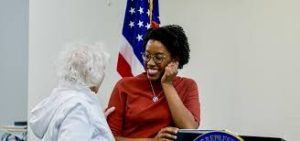Underwood forgoes U.S. Senate race
By Bill Dwyer For Chronicle Media — May 23, 2025
U.S. Rep. Lauren Underwood, D-Naperville, talks with a woman following a meeting. Underwood said she is bypassing the U.S. Senate race to stay in the U.S. House. (U.S. Rep. Lauren Underwood photo)
Saying that she intends to “continue working to drive down costs for American families, flip the House, and elect a new generation of changemakers,” 14th District Illinois Congresswoman Lauren Underwood announced Monday she will not enter the 2026 primary race for the U.S. Senate seat being vacated by retiring Sen. Richard Durbin.
The U.S. Senate primary in March 2026 is expected to be one of the most expensive primaries in the country.
Underwood would have been the third sitting Illinois Congressperson to enter the Democratic Senate primary, along with Raja Krishnamoorthi, D-10th, and Robin Kelly, D-2nd. Illinois Lt. Gov. Juliana Stratton has also announced her candidacy.
“I’ve decided the most powerful way for me to defend our values and hold Donald Trump accountable is to help Democrats win back the House,” Underwood said in a statement. “I’m excited to keep leading that fight at home and in Washington,”
In an appearance on CNN with Kasie Hunt on Monday, May 19, Underwood elaborated a bit.
“I got to work when I was elected in the 2018 cycle and passed a bill to lower healthcare costs for people who have (Affordable Care Act) coverage,” she told Hunt. “It’s helped millions of families around the country afford healthcare. And now Donald Trump and my colleagues across the aisle are seeking to undo all of that progress that we’ve made.”
Underwood, who upset Republican incumbent Randy Hultgren in 2018 to flip the 14th District Democratic, is a rising star in the Democratic Party. In 2022, she was elected a co-chair of the House Democratic Policy and Communications Committee, the party’s public messaging arm.
She is the ranking member of the Homeland Security Subcommittee on Appropriations, and on two other subcommittees.
Underwood is comfortably ensconced in a district that has grown bluer since 2018, helped along by redistricting. Her only genuinely close race was against former Illinois State Sen. James Oberwies in 2020, when she won by just 1 percentage point. She soundly defeated Republican challenger James Marter by nearly 10 percentage points in November. Underwood will face Marter again in the November 2026 general election.
But Underwood’s rising party profile and growing responsibilities in the House appear to be just one of two major considerations for the fourth-term lawmaker’s decision to stay in the House.
While a recent poll had Underwood leading a hypothetical candidate field with 33 percent, followed by Krishnamoorthi at 30 percent and Stratton with 16 percent, both Krishnamoorthi and Stratton have deep financial resources that will inevitably be needed in a Democratic primary that is expected to be both highly contentious and very expensive.
Underwood has demonstrated strong fundraising capabilities over her first four terms in Congress, raising more than $7.8 million in the 2020 cycle, according to filings with the Federal Election Commission, and nearly $6.9 million in 2022. She currently has around $1.1 million on hand.
That pales in comparison, however, to what Krishnamoorthi, who announced on May 10, already has on hand. Krishnamoorthi brought in $3 million in the first three months of 2025 alone and has accumulated a $19 million war chest. He is already running digital campaign ads with nine months to go before the March 17 primary.
Stratton, who announced in April, is endorsed by and financially backed by Illinois Gov. J.B. Pritzker, a billionaire who routinely contributes millions to various Democratic political funds and has effectively limitless financial resources.
Kelly, who was polling fourth with 10 percent, has $2 million in the bank.
“This is going to be a really rigorous, competitive election,” Underwood told CNN. “And I think the voters are excited to have a choice.”
Earlier this month Durbin told CNN that he’s “not planning on endorsing anybody, but I’m not ruling it out.”
The winner of the March 2026 Democratic primary will face a Republican candidate and party in the November 2026 general election emboldened by the opportunity of the first open contest for an Illinois U.S. Senate seat in 30 years. Four relatively unknown candidates have declared for the GOP primary so far.
Republican Congressman Darin LaHood, R-16th, has been reportedly considering running for the GOP nomination, although in April, he told Rockford TV station WIFR that he “absolutely” plans to re-run for his House seat.







